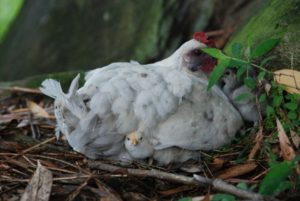 As parents, most of us make terrible fortune-tellers. When my daughter Eileen was a first-grader, she was sent to the principal’s office for fighting with her friend Eric. Apparently, he’d put a rock in the way of ants marching on the sidewalk, and Eileen felt bad for them “because they are so little it made it hard for them to do their work.” When Eric refused to move the rock, Eileen kicked him in the shins.
As parents, most of us make terrible fortune-tellers. When my daughter Eileen was a first-grader, she was sent to the principal’s office for fighting with her friend Eric. Apparently, he’d put a rock in the way of ants marching on the sidewalk, and Eileen felt bad for them “because they are so little it made it hard for them to do their work.” When Eric refused to move the rock, Eileen kicked him in the shins.
At the time, I interpreted Eileen’s motivations as tender-heartedness (toward the ants, anyway), but I never would have imagined that this foreshadowed an interest in workers’ rights. Today, Eileen researches and writes about working conditions in Latin America for a D.C. think tank.
We know from experience that we don’t know how our lives will unfold and that we often see our own life events more clearly in retrospect. Looking back, we can see how seemingly random events make up the stones in our life’s pathway toward individuation. It’s all the more difficult, then, to look ahead and see how our children’s sense of identity is deepening, especially when that journey doesn’t match with what we’ve mapped out for them.
From Childcare to College: Joys, Disappointments, and Worries
As prospective parents, we tell ourselves stories about what our child will be like, entertaining idealized images of family life. As parents, we need to be respectful of the way our child’s life will coalesce—but staying out of it is tough. We want to help and shape them; isn’t that our job? But for most parents, those idealized imaginings will be replaced with a realistic understanding that comes from experience. From childcare to college, there will be joys, but also disappointments and worries.
The Haggadah (the book of readings for a Seder service) refers to four types of children who, viewing the Seder in different ways, ask different questions about Passover. One child is wise, one wicked, one simple, and one doesn’t know how to ask. Why four types? According to artist David Moss, “Every child is unique and the Torah embraces them all. . . . Diversity, how we deal with it, and how we can discover the blessing within it, is perhaps the theme of the midrash of the Four Children.” For good reason, Moss represents the four children as playing cards: “As in a game of chance, we have no control over the children dealt us. It is our task as parents, as educators, to play our hand based on the attributes of the children we are given.”
Many factors will play a role in who our child becomes. When we try too hard to control who our child becomes (social butterfly, academic striver, sports hero) we risk ignoring their own preferences and their ability to develop according to a rhythm of their own. That is not all we risk. As Carl Jung wrote, “Nothing exerts a stronger psychic effect upon the environment, and especially upon children, than the life which the parents have not lived.” (“Paracelsus,” 1929. The Spirit in Man, Art, and Literature, tr. R. F. C. Hull, 1966.) Pushing our children to be the best at something they don’t feel engaged with is too often our way of living our lives through our child, rather than allowing them to grow in ways they would choose.
Knowing When to Step In and When to Let Go
 Kids have inborn abilities that we can support and encourage, respecting the differences between them, their siblings, and their peers. The way the Army and Air Force train bomb-sniffing dogs illustrate this concept. All dogs have olfactory acuity, but for a dog to do well in training, it must be willing to go to the target repeatedly without fetching (which would have disastrous results) and without losing interest, instead of being motivated by the dog handler’s praise and rewards. So, even in such an important and dangerous job, the factors of individual traits (good nose, persistence), and environmental (the handler’s praise and rewards) play a role in which dogs will succeed at their job. Labs and German shepherds make great bomb sniffers, but my Tibetan terrier would never have been good at this job. If I throw a stick for her to fetch, she just stares at me. But she’s a great help in alerting me with her shrill bark (in the middle of the night) to the raccoons in the trees. The point is, I love her even if she’ll never be a good retriever; she’s a fantastic Tibetan terrier.
Kids have inborn abilities that we can support and encourage, respecting the differences between them, their siblings, and their peers. The way the Army and Air Force train bomb-sniffing dogs illustrate this concept. All dogs have olfactory acuity, but for a dog to do well in training, it must be willing to go to the target repeatedly without fetching (which would have disastrous results) and without losing interest, instead of being motivated by the dog handler’s praise and rewards. So, even in such an important and dangerous job, the factors of individual traits (good nose, persistence), and environmental (the handler’s praise and rewards) play a role in which dogs will succeed at their job. Labs and German shepherds make great bomb sniffers, but my Tibetan terrier would never have been good at this job. If I throw a stick for her to fetch, she just stares at me. But she’s a great help in alerting me with her shrill bark (in the middle of the night) to the raccoons in the trees. The point is, I love her even if she’ll never be a good retriever; she’s a fantastic Tibetan terrier.
We don’t know who our children will become. There is no way to predict or order the perfect offspring. They are shaped by many factors. Our role as parents is to provide the best environment for their growth, knowing when to step in and when to let go.
- Psychotherapy in the Virtual Space: How teletherapy has changed the way we give and get care - April 26, 2021
- (home video area – couples counseling) - November 23, 2011
- (home video area – mindfulness) - November 23, 2011


rosemary says
The hardest lesson I’m learning, as i accept estrangement from my adult son, is that when young, they must go with us, live with us, follow us wherever we go…and have no choice in the matter of who we are, or how we make our choices, affecting them so deeply. As maturing adults, hopefully they get to separate, individuate, and come into their own maturity, sometimes with the help of therapy, and always with loving connections to others. Thanks!
Dr. Susan O'Grady says
Rosemary, Well said. We invest tremendous amounts of time and care and then they leave us to pursue their individuated lives! And that, as you say, is how it should be. Maybe that is one of the best reasons as parents, to not give up our on own individuation and all that means for us–as separate beings from our children.
Pat says
Hi Susan,
Great photos! Letting go is hard, and accepting the occasional offering of an unsolicited email or a home cooked meal (when he is home) is always a delight, without strings attached (on my part). My two are so different in adulthood, and I love that my married son shares his life and those of his two kids with us.
Pat
Dr. Susan O'Grady says
Pat, It is interesting to see how the parent-child evolves as they become adults. Thank you for sharing your thoughts.
Dominic says
You touch on some deep truths about parenthood. Thanks for your wise words.
Dr. Susan O'Grady says
Dominic, I appreciate your taking the time to leave your comment. Thank you.
Carolyn says
Susan,
This is a very well articulated article concerning how one has only so much influence on our offspring. The biology is there and it takes a very wise and centered parent to know how to nuture those internal traits that are pre-determined. This fact still means that being a parent is one of the most important jobs that exists. It is much more difficult to be able to be guided by your child’s inner -being than to impose your own hopes and dreams.
You have done an excellent job describing this and obviously and excellent job in allowing your own children to live out their own innate potentials.
Your writing is beautiful as you so poignantly describe this paradox that all parents face. Again, you so beautifully point out that this doesn’t mean our job is easier as “they will go their own way”, but more complex in that they still need our love and nurturing and support in pursing their best selves.
Keep on writing!
Carolyn
Dr. Susan O'Grady says
Carolyn, I appreciate your thoughts and insight about this. Thank you for your input.
Susan